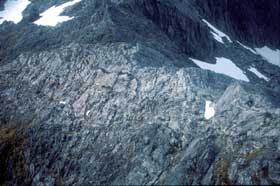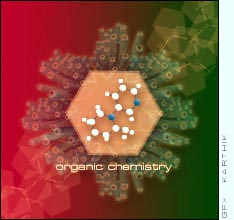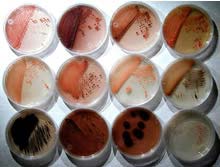
Understanding how mountains form is critically important — from volcanic eruptions to earthquakes to catastrophic mudslides, the geologic processes active in mountain belts affect human societies every day. Yet, even though mountains are on all continents and in all ocean basins, scientists still understand relatively little about the forces that interact to form and destroy mountains, how mountains change over time, and the relationship between mountains and Earth’s climate.
To better

In an organic chemistry lab located in the Science II building on the campus of Binghamton University, Scott Handy is busy whipping up promising new substances modeled after natural compounds found in sea sponges and tobacco plants. Some of the synthetic compounds could help in the fight against cancer and AIDS. Others could provide a safer, more effective, and more affordable alternative to the traditional solvents organic chemists use to catalyze reactions and synthesize compounds, one molecule at
The discovery of 160 year old records in the archives of the Royal Society, London, has given scientists further evidence that Australian sea levels are rising.
Observations taken at Tasmania’s Port Arthur convict settlement 160 years ago by an amateur meteorologist have been compared with data from a modern tide gauge.
“There is a rate of sea level rise of about 1mm a year, consistent with other Australian observations,” says Dr David Pugh, from the UK’s Southampton Ocean

Promising cancer-fighting candidates emerge from tropical ocean ‘mud’
Although the oceans cover 70 percent of the planet’s surface, much of their biomedical potential has gone largely unexplored. Until now.
A group of researchers at Scripps Institution of Oceanography at the University of California, San Diego, have for the first time shown that sediments in the deep ocean are a significant biomedical resource for microbes that produce antibiotic molecules.
In a seri
Findings detailed in Jan. 16 issue of Nature; greenhouse gases implicated
A study by University of Massachusetts Amherst geoscientist Robert DeConto posits an alternative theory regarding why Antarctica suddenly became glaciated 34 million years ago. The study challenges previous thinking about why the ice sheet formed and holds ramifications for the next several hundred years as greenhouse gases continue to rise. DeConto, who collaborated with David Pollard of Pennsylvania State Univ
Climate change had little to do with the demise of the dinosaurs, but the last million years before their extinction had a complex pattern of warming and cooling events that are important to our understanding of the end of their reign, according to geologists.
“The terrestrial paleoclimate record near the K-T is historically contradictory and poorly resolved,” says Dr. Peter Wilf, assistant professor of geosciences at Penn State. “In contrast, the resolution of K-T marine climates that has